TUESDAY'S SCRIPT TIP:
PITCHING YOUR TAKE
Welcome to Hollywood, are you ready to pitch your take? You don't want to keep them
waiting, they are very busy people. What? You don't have a take? You don't even know
what a take is? Well, what the heck are you doing here? Can we reschedule you for
next Thursday? Will you have a take by then?

Screenwriting is all about ideas. You have this great idea for a story, so you write it...
and the script is so good that it makes the rounds of studio based producers. This
results in dozens of meetings, where they tell you this is the greatest script they have
ever read... but they aren't going to buy it. You may think that's a bad thing, but it's
really business as ususal in Hollywood. That great spec script is usually just an
audition piece for assignments. How do you get an assignment? You pitch your take.
Pitching your take is telling the development executive how you would write or rewrite
the material. It's just like pitching your idea to a studio, but it's not your idea. I've done
this a million times, and I don't really like assignments. When I had scripts go wide, and
50 reads would end up getting me 48 meetings, the first thing they'd always do is tell
me how much they loved the script... and that they weren't going to buy it. But they had
a project that they thought might fit my writing skills, and they would love to hear my
take on it. Then they give you some property that they own - a book, a magazine article,
a comic book, a script somebody else wrote that they *did* buy... some of this stuff is
amazing - they may own a board game or a non-fiction dating guide they want to turn
into a rom-com. Then they set up another meeting, where you have to pitch your take.
Your mission is to read the material and figure out some way to turn it into a movie.
One Oscar winning producer had a magazine article about a Airforce guy who worked
in a Nuclear Missile Silo. This was a guy in his 20s with a wife and kid who might have
to push the button that starts World War 3. A lot of pressure. They gave me some
"rules" for my take - the button could not be pressed - this wasn't a WW3 movie. Hmm,
what does that leave? A guy sitting in a silo with his finger over the button... worried?
They didn't give me the actual magazine article, they gave me a copy of a copy that
already had every writer in L.A.'s fingerprints on it... and this lead me to believe that all
of those other writers hadn't been able to figure out how to tell an interesting story
without ever using the conflict. The best I could come up with was a domestic drama
about a guy under a lot of pressure at work... and we've seen that about a million times
before, and it really has nothing to do with the nuclear missile silo thing. Their rule made
creating an interesting story close to impossible - and if all of those other hundreds of
writers who had been invited to pitch their take had failed... well, so would I. Since I
haven't seen this movie or heard anything about it going into production, I doubt than
anyone who pitched their take after me cracked the puzzle.

Obviously this is an interesting person in an interesting situation... but the stress is
internal and can't be seen on screen. The elements that make it special (nuclear missile
silo and the threat of WW3) are background elements. You may remember a big
budget movie with Billy Bob Thornton and John Cusack about air traffic controllers
dealing with stress *also* based on a magazine article - a major flop. Same problem -
stress is an internal conflict that shows up on the page but not on the screen... and the
high stakes job had to stay in the background (or it would be a movie about an airplane
crash, and the traffic controllers are no longer part of the story). You end up with a film
about guys who sit in a room and look at a screen all day long - not exactly film
material. That film added practical jokes and a love triangle, and became a low-rent
version of TIN MEN... a film about the exciting world of aluminum siding salesmen.
(oddly. that film was called PUSHING TIN - which is a lot like TIN MEN)
After one producer told me how much he loved my script, but wasn't going to buy it; he
took me to a room *filled* with screenplays - hundreds of them. He told me to pick any
five, read them, and pitch my take on the one I liked most. I was a bit confused - did he
own all of these scripts? Yes. These are the scripts he has bought throughout his
decades as a producer... that never got made. He was always looking for a way to
make them. I grabbed five scripts, read them - most had that core of a great idea but
were executed poorly or *missed* the great idea in the script. I figured out how to fix
one of the scripts and pitched that method... and he told me "No!" You see, that was the
script that he bought, what he wanted is a great idea to fix what he bought.
I learned a valuable lesson - most of the time when you pitch your take, you aren't
telling them how to fix the script they bought, but how to *change it* by adding a new
high concept that makes it into a *new* script. Or finding a unique angle or perspective on the material
that isn't part of the existing material. Maybe the story is told from the dog owner's POV and your
take is telling the story from the *dog's* POV.
You see, if it were just a matter of fixing
the script they bought, then buying that script was a bad investment. No, that script
needs something exciting to make it a new and different script... and your job is to pitch
the bad development notes version ("What if they were cowboys?").

On the second script I pitched my take on (I ended up doing all five!) I took this into
account and changed the group of teenagers who get picked off one-by-one after
witnessing a lynching in the deep south into a racist undercover cop and his informant
who infiltrate a Klan-like group who are burning down churches. That may sound like a
major change, but much of the script could remain the same - I just "grew up" the
protagonist and turned it from a drive in movie from the 70s into a cross between
DONNIE BRASCO and MISSISSIPPI BURNING... and I almost got to write it! I pitched
it again to the big boss, and after a few tense days, they decided not to do it.
Then I pitched takes on the other 3 scripts from the shelf, but none of them got close to
that second pitch. Time spent doing all of this: months and months! Payment: zero.
Though I don't know the background on the movie BLOOD DIAMOND, my guess is that
the original script was entirely about the Djimon Hounsou character... and it probably sat around on
the shelf because a movie about Africa starring a Black African didn't leave any room
for a $20 million star (most of whom are white). So, eventually somebody pitched their
take of the story that included the Leonardo DiCaprio character... and that made it a
viable project. Hey, throw in some hot white chick journalist as a love interest and we
have a movie! That's an example of how pitching your take works.
Another example might be THE MUMMY movies. Universal was trying to mine their old
horror properties, and Steven Sommers pitched his take: instead of a straight horror
movie like the original, it's an Indiana Jones adventure film!
Someone came in and pitched their take on the board game BATTLESHIP ("G7." "You sunk my battleship!") and
came up with *alien* battleships as part of an alien invasion at sea... and one summer we got to see that
take on the big screen with Liam Neeson yelling "You sunk my battleship!" - imagine all of the other
possible "takes" for the board game BATTLESHIP... and that's your job as a screenwriter.
In fact, just for fun why don't you take a moment and come up with a *different* summer blockbuster take on
the board game "Battleship" - no aliens.

You also get to pitch your take on novels. I know I've mentioned turning down the job of
adapting ANGELS & DEMONS and some other books. In retrospect, a huge mistake...
but at the time it made perfect sense. The Dan Brown novel was not a best seller at the
time, it was this book that nobody had ever heard of from the New Age division of Simon
& Schuster. I read it, and wasn't impressed. The producer *loved* conspiracy stories, so
that's why he'd optioned it. The book had two plots happening simultaneously, and they
came together at the end - something that works in a novel but almost never works on
screen. So my take was to jettison one of the plots and focus on the other one. In this
case, the producer liked *both* plots and wanted to keep them - just find a way to tell
this really complicated story in under 2 hours and use the standing set he had access
to. I didn't think that was going to work well, and decided not to pitch another take on
the project. I have no idea how many writers came after me on that project, but the
producer's option lapsed and now it's a big budget Tom Hanks film... that didn't do well.
A similar thing happened with the sequel to MAN ON FIRE, a novel called THE
PERFECT KILL. You probably don't know this, but the Denzel version is a remake of a
film from only a few years back starring Scott Glenn... based on a novel. The novel's
sequel was owned by a producer who wanted to make it (probably with Scott Glenn
again) before the Denzel remake was announced. I read the book, which had a great
opening scene... then fell apart. My take was to take the core concept and throw away
the details. It would be faithful to the idea of the book, but find better ways to explore
that idea. This ended up close-but-no-cigar because I *didn't* add a new, exciting idea
to the story. I just wanted to fix what was broken and tell the best possible story from
the idea in the novel. I should have made the terrorists into aliens - that might have sold!

Usually when you pitch your take, they want you to add a new exciting idea... not just
tell them how you'd make what they already have work. They've become burned out on
the project, and they want you to come up with something that excites them about it all over again.
If you do end up with a take that is basically the "just done right" version, the best way to pitch it
is to find a new idea that you can drop in that doesn't really change the story - and maybe something that
improves the story. Often if you can come up with a more exciting MacGuffin - they will give you a chance
to fix the story problems while you're at it... even if the MacGuffin wasn't the reason why the script
didn't work.
Another thing about pitching your take that you might have noticed: it will burn up a
whole lotta your time, and you won't make a cent. As long as it's talk, they don't have to
pay you. Once you put something on paper - a treatment or synopsis - they have to cut
you a check if they are a guild signatory company. That allows them to have hundreds
of writers pitching hundreds of takes... at absolutely no cost to them! It's like playing the
lotto for free! If one of these writers pitches some amazing take that knocks their socks
off - they'll take it to the next step. If it ends up just being a big waste of time, they've
lost nothing.
Wait a minute, some of you are saying, haven't they lost a lot of *time*?
Well, that's one of those dirty little secrets of the film biz. Every producer has *two*
businesses going at the same time. One is actually making films, the other is looking
busy. The Development Business. It's a whole lotta make-work to justify the
development staff (and producer)'s salaries (wow is this the cynical version!). They endlessly develop material that has
no chance of ever getting to screen. Okay, very little chance of getting to screen. A few years back,
Sean Connery sued a producer who had a reputation for optioning and developing screenplays with no intention of ever actually making them. They could keep their office
on the lot and their development fund from the studio as long as they never made a film that bombed...
They were "invisible" as long as they were spending a few hundred thousand on scripts and writers (and overhead),
but if they made a film for $50 million that bombed? Um, they would no longer be invisible and would probably lose their deal.
Though they had made films with outside financing (non-studio), that money had dried up... so they were just developing projects on the studio's allowance. Well,
one of their scripts had Sean Connery attached to star - and wasn't getting any closer to being made after several years.
Connery was getting frustrated, and eventually sued them. I think that's when they stopped being "invisible" and
probably lost their deal.
Though some development is just an excuse to have a development staff working all
the time, studios and producers like to think of this as panning for gold. You have to do
a lot of panning to find a little gold. Most of the panning is pointless. And even if you find
gold in this case, the script may still end up on the shelf - there's no director or star
attached. Studios only make about 10% of the stuff they buy... maybe even less than
that! But they endlessly develop all of the stuff they've bought. If something goes wrong
and Tom Cruise's current project crashes and burns, they may have a replacement
project sitting on the shelf somewhere. It's good to have that stockpile of projects in
case of emergency... and usually these projects are developed to lure some big star to the studio. There is
one Tom Cruise and a whole lotta producers developing screenplays that he might star in. If he
says yes to one and no to 9 others, that's about average. Those other 9 usually get shelved forever...
Unless the producer starts bringing in writers to pitch takes on them.
For *us*, it's usually a huge waste of time... you can keep pitching takes for years after
you have a spec script go out!
So here's your assignment: take the last book or magazine article you read and pitch
your take as a summer tentpole movie starring Tom Cruise and directed by Steven
Spielberg. The last article I read was a piece in Newsweek that brought tears to my
eyes about family road trips....
Okay, now pitch it as a low budget horror movie...
BRAND NEW!
How Do I do That?

101 SCREENWRITING ANSWERS Blue Book!
New to screenwriting? You probably have questions! How do I get an Agent? How do I write a phone conversation? Do I need a Mentor? What’s does VO and OC and OS mean? What is proper screenplay format? Should I use a pen name? Do I need to movie to Hollywood? What’s the difference between a Producer and a Production Manager, and which should I sell my script to? How do I write a Text Message? Should I Copyright or WGA register my script? Can I Direct or Star? How do I write an Improvised scene? Overcoming Writer’s Block? How do I write a Sex Scene? And many many more! This book has the answers to the 101 Most Asked Questions from new screenwriters! Plus a Glossary of terms so that you can sound like a pro! Everything you need to know to begin writing your screenplay!
All of the answers you need to know, from a working professional screenwriter with 20 produced films and a new movie made for a major streaming service in 2023!
Only $4.99
NEWEST AND BLUEST!
Want To Look Like An Expert?

RESEARCH & WORLD BUILDING Blue Book!
Does this gun fire 6 shots or only 5? In all of the excitement of writing your action scene, you might not have done the research... and your hero could be out of ammo! Whether you are writing a novel or screenplay, you can save your hero, and your story, by doing a little research first! This book looks at Why you should research, Whether you should research First or Later, PLUS the importance of World Building in Science Fiction, Fantasy... and the worlds you explore in every other genre. Movies like JOHN WICK and THE GODFATHER take place in their own unique worlds... and writers must create them! YOU are the technical advisor on your Screenplay or Novel.
Using movie examples like TOP GUN, HUNT FOR RED OCTOBER, BLUE CRUSH, ADVENTURE LAND, several of my produced films, JOHN WICK, the novels of Donald E. Westlake and Thomas B. Dewey, SPY KIDS, the LORD OF THE RINGS movies, SOYLENT GREEN (which takes place in the far off future of 2022), and many others we will look at researching stories and creating worlds. The 8 Types Of Research, the 10 Types Of Information To Look For, 12 Important Elements Of World Building. Plus chapters on How To Rob A Bank and Commit Murder And Get Away With It for those of you interested in crime fiction, and Researching The Future for those writing science fiction, and Levels Of Reality if you are writing about a version of the real world.
No matter what you are writing, this book will help you find the facts... or make them up in a convincing way!
Only $4.99
NO KINDLE REQUIRED! Get the *free* app (any device, except your Mr. Coffee) on the order page on Amazon!
NEWISH!
Can You Make It bigger?

BLOCKBUSTERS (and BEACH READS) Blue Book!
Writing something EPIC?
ONLY: $4.99!
Thinking about writing a big Disaster Movie? An Historical Epic? An Epic Adventure Film? Or maybe you like Gladiator Movies? This book looks at writing Blockbusters and those Big Fat Beach Read novels - anything epic! Usng movies like JAWS, POSEIDON ADVENTURE, LAWRENCE OF ARABIA, THE GUNS OF NAVARONE, and those MARVEL and FAST & FURIOUS flicks as examples. What *is* a Blockbuster? 107 years of Blockbuster history! Blockbuster Characters. Blockbuster Story Types! Why modern Blockbusters are soap operas! Social Issues in Blcokbusters? Big Emotions! Keeping All Of Those Characters Distinctive! How to avoid the Big problems found in Big Movies and books! More! If you are writing a Big Event Movie or a Big Fat Novel, there are tips and techniques to help you!
Only $4.99
NEW in 2020!
Making Your Own Movie?
WRITE IT: FILM IT BOOK!

Making Your Own Movie?
Writing An Indie Film?
Writing A Low Budget Genre Script To Sell?
Writing A Made For TV Holiday Movie?
You will be writing for BUDGET. On a standard spec screenplay, you don’t have to think about budget, but these types of screenplays writing with budget in mind is critical!
If you are making your own movie, budget, is even more important - and you need to think about budget *before* you write your screenplay... or you will end up with a script that you can’t afford to make (or is a struggle to make). Everyone is making their own films these days, and even if you have done it before there are lots of great techniques in this book to get more money on screen - for less money! You can make a film that looks like it cost millions for pocket change.
344 Pages - ONLY: $7.99!
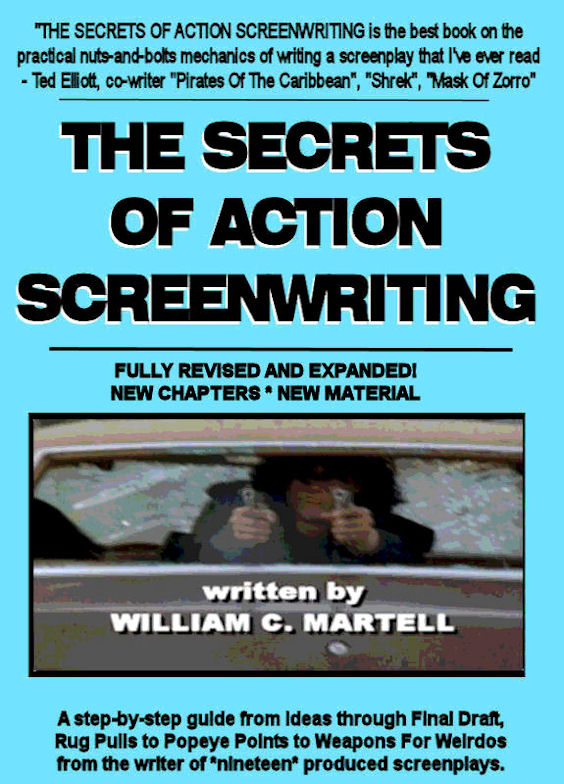
THE BOOK THAT STARTED IT ALL!
*** THE SECRETS OF ACTION SCREENWRITING *** - For Kindle!
*** THE SECRETS OF ACTION SCREENWRITING *** - For Nook!
Why pay $510 for a used version of the 240 page 2000 version that used to retail for $21.95? (check it out!) when
you can get the NEW EXPANDED VERSION - over 500 pages - for just $9.99? New chapters, New examples, New techniques!
"SECRETS OF ACTION SCREENWRITING is the
best book on the practical nuts-and-bolts mechanics of writing a screenplay I've ever read."
- Ted Elliott, co-writer of MASK OF ZORRO, SHREK, PIRATES OF THE CARIBBEAN and the sequels (with Terry Rossio). (ie; 4 of the top 20 Box Office Hits Of ALL TIME.)
Only $9.99 - and no postage!
NO KINDLE REQUIRED! Get the *free* app (any device, except your Mr. Coffee) on the order page on Amazon!
BRAND NEW!
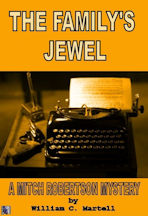
***
MITCH ROBERTSON #2: THE FAMILY'S JEWEL *** - For Kindle!
"The Presidential Suite of the Hollywood Hoover Hotel looked like a bloody battlefield: bodies everywhere, furniture broken, red liquid dripping from the walls, dead soldiers littering the elegant Berber rug as clouds of smoke overhead bounced between two air conditioning vents.
Mitch Robertson stepped over the body of an ex-child star turned sex tape star turned pop star and entered the room, spotted a gun on the floor and picked it up... careful not to spill his coffee with three pumps of mocha syrup from Penny’s Coffee Shop. That coffee was gold, the only thing keeping him going in this dazed state of wakefulness. The gun felt light. Holding it, he saw the silhouette of an 80s action star sitting sideways on a tipped over chair. Motionless. Was he dead? Mitch was still hung over from the Awards Party the night before, and wondered whether this was all some sort of crazy nightmare that he would wake up from... but when he tripped over the brown legs of a bottomless Superhero, flaccid junk encased in a condom but still wearing his mask, and hit the edge of the sofa, gun skittering and coffee spilling, he realized that it was all very real. What the hell had happened here?"
Short Novel. Only 99 cents! - and no postage!
ADVICE FROM 1920!
*** VINTAGE #1: HOW TO WRITE PHOTOPLAYS *** - For Kindle!
***
Screenwriting books have been around as long as films have. This series reprints vintage screenwriting books with a new introduction and history, plus new articles which look at how these lessons from almost 100 years ago apply to today’s screenplays. Anita Loos book is filled with information which still applies.
In addition to the full text of the original book, you get the full screenplay to Miss Loos' hit THE LOVE EXPERT, plus several new articles on the time period and women in Hollywood.
ONLY $2.99 - and no postage!
Tips FAQ

My New Script Secrets Newsletter!


STORY IN ACTION SERIES!

THE MISSION IMPOSSIBLE MOVIES
NEW: Updates On Films 7 & 8 Casting!
All Six Movies analyzed! All of the mission tapes, all of the “that’s impossible!” set pieces and stunts, the cons and capers - and how these scenes work, the twists and double crosses, the tension and suspense (and how to generate it), the concept of each film as a stand alone with a different director calling the shots (broken in the sixth film), the gadgets, the masks, the stories, the co-stars and team members (one team member has been in every film), the stunts Tom Cruise actually did (and the ones he didn’t), and so much more! Over 120,000 words of fun info!
THE MISSION IMPOSSIBLE MOVIES - 347 Pages - Only $3.99 !

BRAND NEW!
*** THE BOURNE MOVIES
NEW: Updates on TREADSTONE TV show!
All five "Bourne" movies (including "Legacy" and it's potential sequels) - what are the techniques used to keep the characters and scenes exciting and involving? Reinventing the thriller genre...
or following the "formula"? Five films - each with an interesting experiment! A detailed analysis of each
of the films, the way these thrillers work... as well as a complete list of box office and critical
statistics for each film. This book is great for writers, directors, and just fans of the series.
Only $3.99 - and no postage!
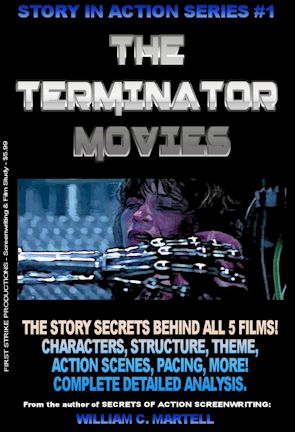
Over 240 pages!
*** THE TERMINATOR MOVIES *** - For Kindle!
He's back! The release of "Terminator: Dark Fate" is set to begin a new trilogy in
the Terminator story... 35 years after the first film was released. What draws us to these films about
a cybernetic organism from the future sent back in time? Why is there a new proposed trilogy every few
years? This book looks at all five Terminator movies from a story standpoint - what makes them work
(or not)? What are the techniques used to keep the characters and scenes exciting and involving? How
about those secret story details you may not have noticed? Containing a detailed analysis of each of
the five films so far, this book delves into the way these stories work... as well as a complete list of
box office and critical statistics for each film. This book is great for writers, directors, and just
fans of the series.
ONLY $3.99 - and no postage!
NO KINDLE REQUIRED! Get the *free* app (any device, except your Mr. Coffee) on the order page on Amazon!
HITCHCOCK FOR WRITERS!
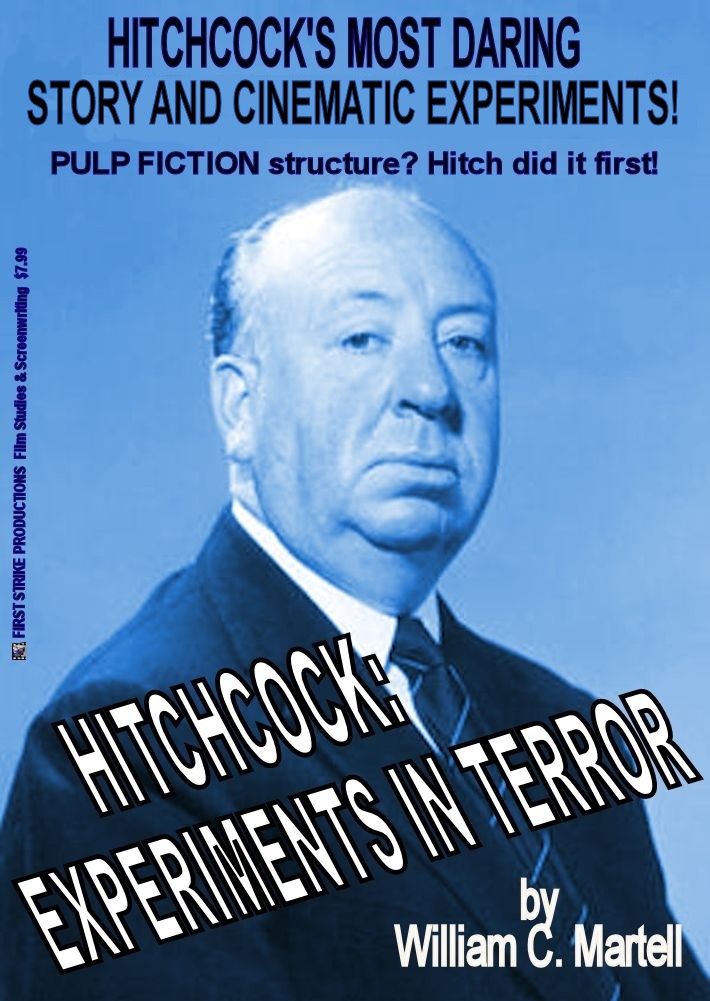
Strange Structures!
*** HITCHCOCK: EXPERIMENTS IN TERROR! *** - For Kindle!
***
Contained Thrillers like "Buried"? Serial Protagonists like "Place Beyond The Pines"? Multiple Connecting Stories like "Pulp Fiction"? Same Story Multiple Times like "Run, Lola, Run"?
HITCHCOCK DID IT FIRST!
This book focuses on 18 of Hitchcock's 52 films with wild cinema and story experiments which paved the way for modern films. Almost one hundred different experiments that you may think are recent cinema or story inventions... but some date back to Hitchcock's *silent* films! We'll examine these experiments and how they work. Great for film makers, screenwriters, film fans, producers and directors.
Only $5.99 - and no postage!
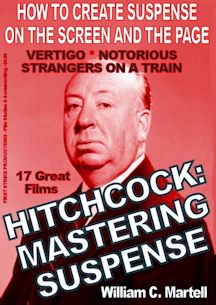
LEARN SUSPENSE FROM THE MASTER!
*** HITCHCOCK: MASTERING SUSPENSE *** - For Kindle!
Alfred Hitchcock, who directed 52 movies, was known as the *Master Of Suspense*; but what exactly is suspense and how can *we* master it? How does suspense work? How can *we* create “Hitchcockian” suspense scenes in our screenplays, novels, stories and films?
This book uses seventeen of Hitchcock’s films to show the difference between suspense and surprise, how to use “focus objects” to create suspense, the 20 iconic suspense scenes and situations, how plot twists work, using secrets for suspense, how to use Dread (the cousin of suspense) in horror stories, and dozens of other amazing storytelling lessons. From classics like “Strangers On A Train” and “The Birds” and “Vertigo” and “To Catch A Thief” to older films from the British period like “The 39 Steps” and “The Man Who Knew Too Much” to his hits from the silent era like “The Lodger” (about Jack The Ripper), we’ll look at all of the techniques to create suspense!
Only $5.99
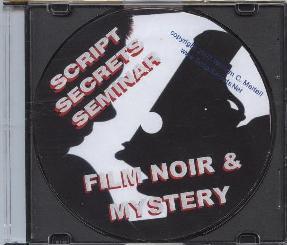
AUDIO CLASS!
NOIR & MYSTERY80 minute CD packed with information on writing Film Noir and Mystery scripts. Using examples from CHINATOWN to OUT OF THE PAST to DOUBLE INDEMNITY you'll learn how to create stories in this dark, twisted genre. How to plant clues, red herrings, suspects, victims, spider women, fallen heroes, the funhouse mirror world of noir supporting characters... and the origins of Film Noir in literature Noir dialogue and how noir endings are different than any other genre. All of the critical elements necessary to write in this critically popular genre.
The Noir & Mystery Class is only $15 (plus $5 S&H). First 20 on Limited Black Disk!
RECESSION SALE! $5 OFF!
IDEAS AND CREATIVITY - 80 minute CD packed with information. Tools to find ideas that are both personal *and* commercial. Hollywood wants scripts with High Concept stories... but not stupid scripts. Developing *intelligent* high concept ideas. How to turn your personal story into a blockbuster - or find your personal story in a high concept idea. Brainstorming and being creative. Ideas and Creativity is $10.00 (plus $5 S&H)
WRITING INDIES - Writing an Indie film? This class covers everything you need to know - from Central Locations to Confined Cameos. Using examples from SWINGERS, THE COOLER, STATION AGENT and others, this 80 minute CD is packed with information. How Indoe films challenge the audience (while mainstream films reassure the audience). Structures, using BOYS DON'T CRY, RUN LOLA RUN, HILARY & JACKIE, and others as example. Writing for a budget, writing for non-actors, getting the most production value out of your budget. Writing Indies is $10.00 (plus $5 S&H)
WRITING HORROR - The essentials of a horror screenplay - what do ROSEMARY'S BABY, NIGHT OF THE LIVING DEAD, THE EXORCIST, BRIDE OF FRANKENSTEIN, THE OTHERS and OPEN WATER have in common? This class will tell you! All of the critical elements necessary to write a script that scares the pants off the audience. Writing Horror is $10.00 (plus $5 S&H).
Click here for more information on CLASS CDs!
THE BLUE BOOKS!
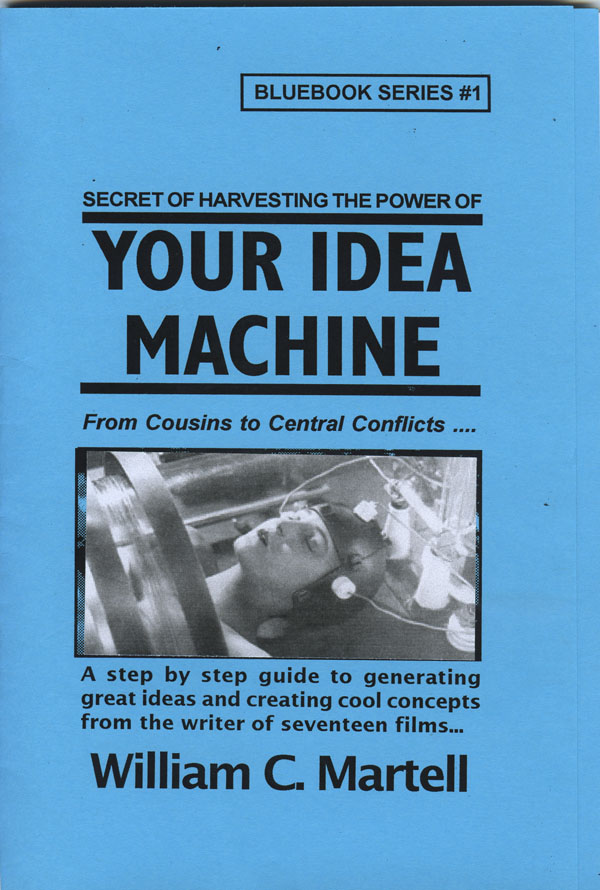
FIND A GREAT IDEA!
*** YOUR IDEA MACHINE *** - For Kindle!
****
Expanded version with more ways to find great ideas! Your screenplay is going to begin with an idea. There are good ideas and bad ideas and commercial ideas and personal ideas. But where do you find ideas in the first place? This handbook explores different methods for finding or generating ideas, and combining those ideas into concepts that sell. The Idea Bank, Fifteen Places To Find Ideas, Good Ideas And Bad Ideas, Ideas From Locations And Elements, Keeping Track Of Your Ideas, Idea Theft - What Can You Do? Weird Ways To Connect Ideas, Combing Ideas To Create Concepts, High Concepts - What Are They? Creating The Killer Concept, Substitution - Lion Tamers & Hitmen, Creating Blockbuster Concepts, Magnification And The Matrix, Conflict Within Concept, Concepts With Visual Conflict, Avoiding Episodic Concepts, much more! Print version is 48 pages, Kindle version is over 175 pages!
Only $4.99 - and no postage!
FIGURE OUT YOUR STORY!
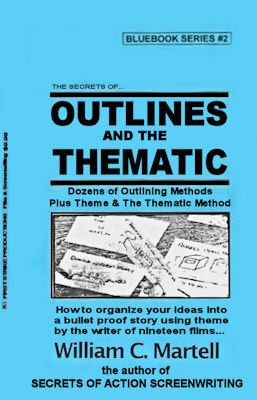
OUTLINES & THE THEMATIC Blue Book.
ARE YOUR SCENES IN THE RIGHT ORDER?
AND ARE THEY THE RIGHT SCENES?
Your story is like a road trip... but where are you going? What's the best route to get there? What are the best sights to see along the way? Just as you plan a vacation instead of just jump in the car and start driving, it's a good idea to plan your story. An artist does sketches before breaking out the oils, so why shouldn't a writer do the same? This Blue Book looks at various outlining methods used by professional screenwriters like Wesley Strick, Paul Schrader, John August, and others... as well as a guest chapter on novel outlines. Plus a whole section on the Thematic Method of generating scenes and characters and other elements that will be part of your outline. The three stages of writing are: Pre-writing, Writing, and Rewriting... this book looks at that first stage and how to use it to improve your screenplays and novels.
Only $4.99 - and no postage!
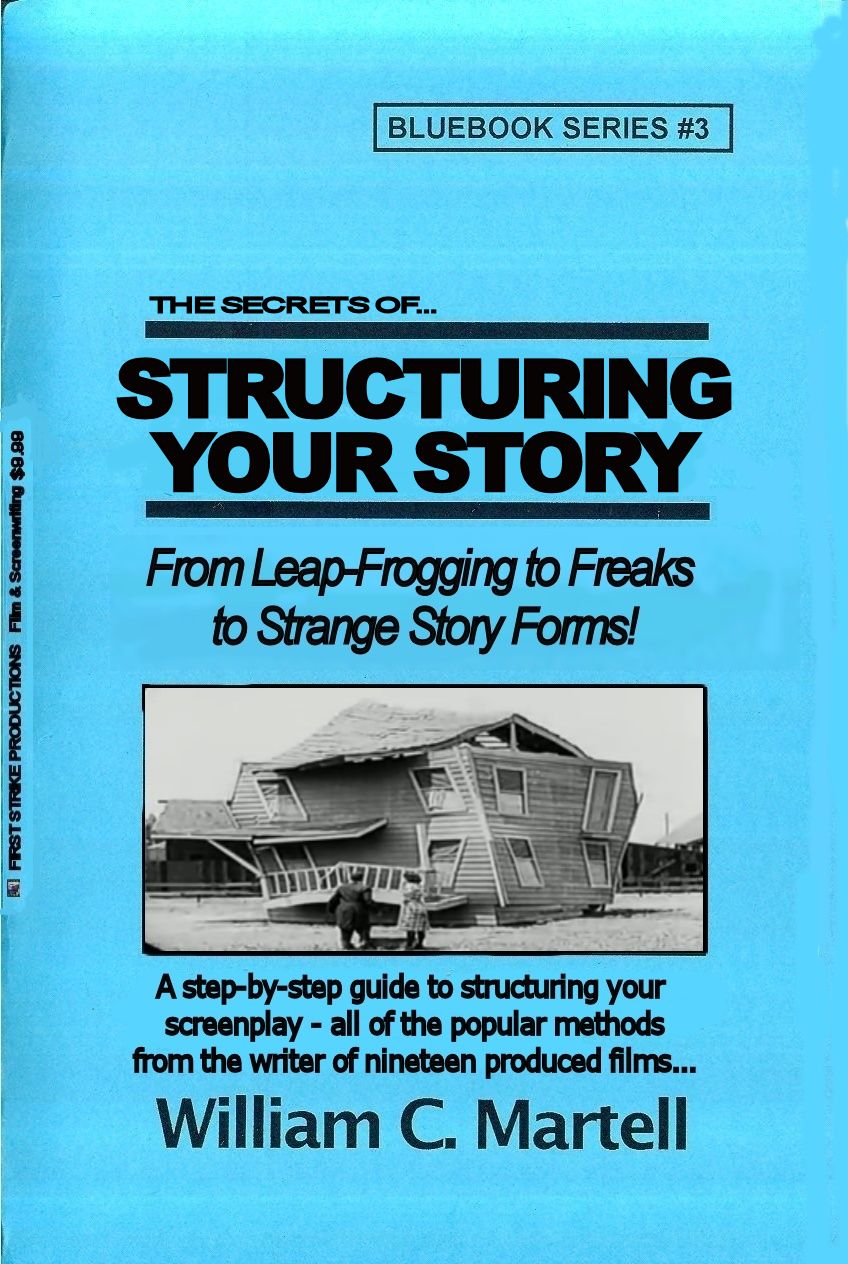
GOT STRUCTURE?!
*** STRUCTURING YOUR STORY *** - For Kindle!
William Goldman says the most important single element of any screenplay is structure. It’s the skeleton under the flesh and blood of your story. Without it, you have a spineless, formless, mess... a slug! How do you make sure your structure is strong enough to support your story? How do you prevent your story from becoming a slug? This Blue Book explores different types of popular structures from the basic three act structure to more obscure methods like leap-frogging. We also look at structure as a verb as well as a noun, and techniques for structuring your story for maximum emotional impact. Most of the other books just look at *structure* and ignore the art of *structuring* your story. Techniques to make your story a page turner... instead of a slug!
Only $4.99 - and no postage!

STORY: WELL TOLD!
*** STORY: WELL TOLD *** - For Kindle!
This book takes you step-by-step through the construction of a story... and how to tell a story well, why Story always starts with character... but ISN'T character, Breaking Your Story, Irony, Planting Information, Evolving Story, Leaving No Dramatic Stone Unturned, The Three Greek Unities, The Importance Of Stakes, The Thematic Method, and how to create personal stories with blockbuster potential. Ready to tell a story?
Print version was 48 pages, Kindle version is over 85,000 words - 251 pages!
Only $4.99 - and no postage!

START STRONG!
*** HOOK 'EM IN TEN *** - For Kindle!
Your story doesn't get a second chance to make a great first impression, and this book shows you a
bunch of techniques on how to do that. From the 12 Basic Ways To Begin Your Story, to the 3 Stars Of
Your First Scene (at least one must be present) to World Building, Title Crawls, Backstory, Starting
Late, Teasers and Pre Title Sequences, Establishing Theme & Motifs (using GODFATHER PART 2), Five Critical
Elements, Setting Up The Rest Of The Story (with GODFATHER), and much more! With hundreds of examples
ranging from Oscar winners to classic films like CASABLANCA to some of my produced films (because
I know exactly why I wrote the scripts that way). Biggest Blue Book yet!
Print version was 48 pages, Kindle version is over 100,000 words - 312 pages!
Only $4.99 - and no postage!
NO KINDLE REQUIRED! Get the *free* app (any device, except your Mr. Coffee) on the order page on Amazon!
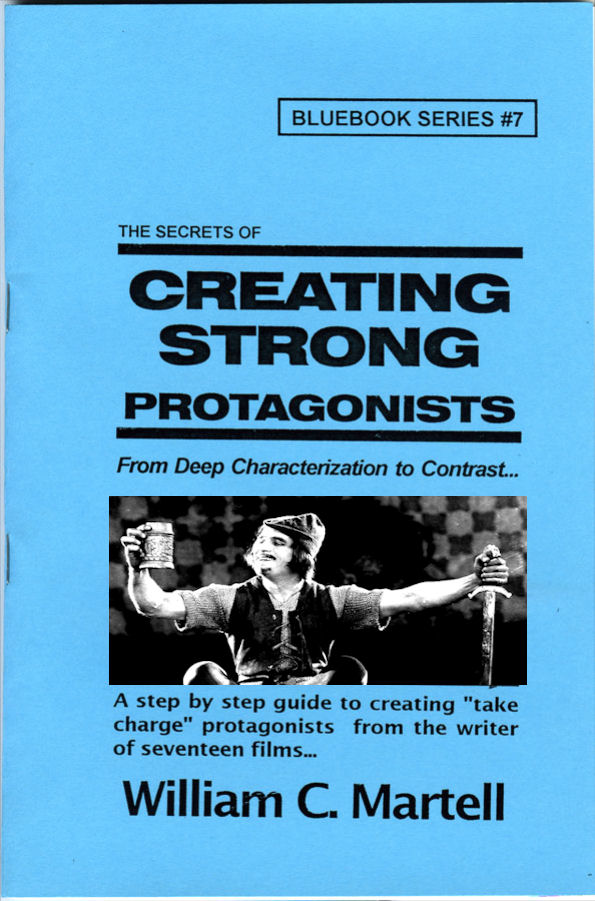
MOVIES ARE CHARACTERS!
*** CREATING STRONG PROTAGONISTS *** - For Kindle!
*** CREATING STRONG PROTAGONISTS *** - For Nook!
Expanded version with more ways to create interesting protagonists! A step-by-step guide to creating "take charge" protagonists. Screenplays are about characters in conflict... characters in emotional turmoil... Strong three dimensional protagonists who can find solutions to their problems in 110 pages. But how do you create characters like this? How do you turn words into flesh and blood? Character issues, Knowing Who Is The Boss, Tapping into YOUR fears, The Naked Character, Pulp Friction, Man With A Plan, Character Arcs, Avoiding Cliche People, Deep Characterization, Problem Protagonists, 12 Ways To Create Likable Protagonists (even if they are criminals), Active vs. Reactive, The Third Dimension In Character, Relationships, Ensemble Scripts, and much, much more. Print version is 48 pages, Kindle version is once again around 205 pages!
ONLY $4.99 - and no postage!
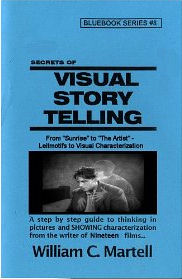
I WRITE PICTURES!
*** VISUAL STORYTELLING *** - For Kindle! (exclusive)
Show Don't Tell - but *how* do you do that? Here are techniques to tell stories visually! Using Oscar Winning Films and Oscar Nominated Films as our primary examples: from the first Best Picture Winner "Sunrise" (1927) to the Oscar Nominated "The Artist" (which takes place in 1927) with stops along the way Pixar's "Up" and Best Original Screenplay Winner "Breaking Away" (a small indie style drama - told visually) as well as "Witness" and other Oscar Winners as examples... plus RISE OF THE PLANET OF THE APES. Print version is 48 pages, Kindle version is over 200 pages!
ONLY $4.99 - and no postage!
DESCRIPTION & VOICE Blue Book!
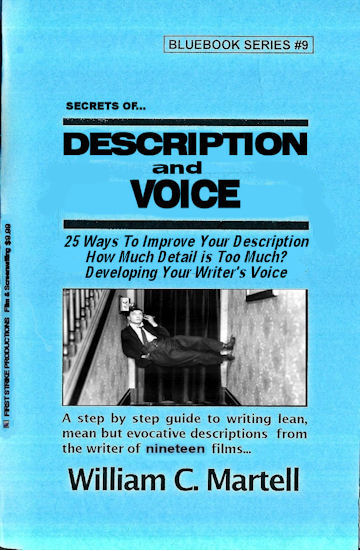
DESCRIPTION & VOICE Blue Book.
IS HALF OF YOUR STORY IN TROUBLE?
Most screenplays are about a 50/50 split between dialogue and description - which means your description is just as important as your dialogue. It just gets less press because the audience never sees it, the same reason why screenwriters get less press than movie stars. But your story will never get to the audience until readers and development executives read your script... so it is a very important factor. Until the movie is made the screenplay is the movie and must be just as exciting as the movie. So how do you make your screenplay exciting to read? Description is important in a novel as well, and the “audience” does read it... how do we write riveting description?
Only $4.99 and no postage!

PRO DIALOGUE TECHNIQUES!
*** DIALOGUE SECRETS *** - For Kindle!
***
Expanded version with more ways to create interesting dialogue! How to remove bad dialogue (and what *is* bad dialogue), First Hand Dialogue, Awful Exposition, Realism, 50 Professional Dialogue Techniques you can use *today*, Subtext, Subtitles, Humor, Sizzling Banter, *Anti-Dialogue*, Speeches, and more. Tools you can use to make your dialogue sizzle! Special sections that use dialogue examples from movies as diverse as "Bringing Up Baby", "Psycho", "Double Indemnity", "Notorious", the Oscar nominated "You Can Count On Me", "His Girl Friday", and many more! Print version is 48 pages, Kindle version is over 175 pages!
Only $4.99 - and no postage!

WHAT IS A SCENE?
*** SCENE SECRETS *** - For Kindle!
***
What is a scene and how many you will need? The difference between scenes and sluglines. Put your scenes on trial for their lives! Using "Jaws" we'll look at beats within a scene. Scene DNA. Creating set pieces and high concept scenes. A famous director talks about creating memorable scenes. 12 ways to create new scenes. Creating unexpected scenes. Use dramatic tension to supercharge your scenes. Plants and payoffs in scenes. Plus transitions and buttons and the all important "flow"... and more! Over 65,000 words! Print version was 48 pages, Kindle version is around 210 pages!
Only $4.99 - and no postage!
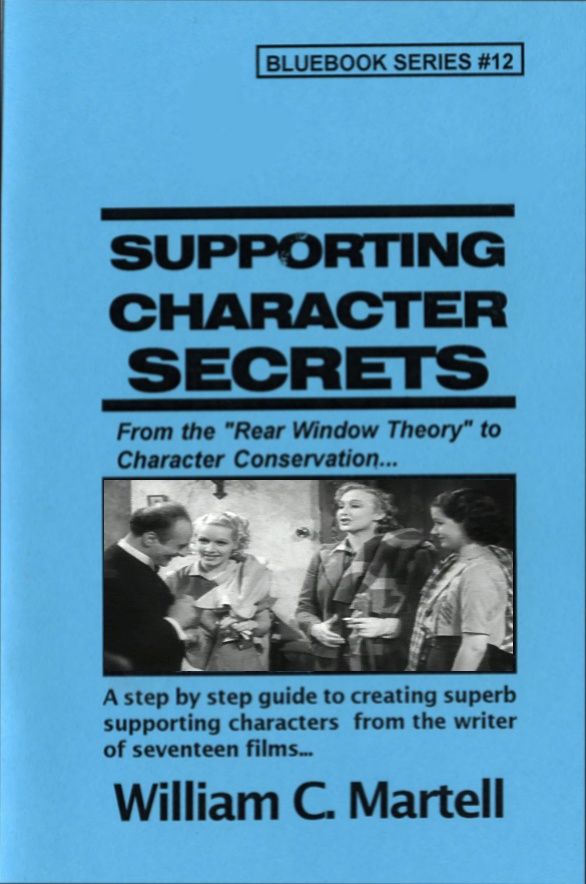
SUBPLOTS?
*** SUPPORTING CHARACTER SECRETS *** - For Kindle! (Exclusive)
Expanded version with more techniques to flesh out your Supporting Characters and make them individuals. Using the hit movie BRIDESMAIDS as well as other comedies like THE HANGOVER and TED and HIGH FIDELITY and
40 YEAR OLD VIRGIN and many other examples we look at ways to make your Supporting Characters come alive on the page.
Print version was 48 pages, Kindle version is around 170 pages!
ONLY $4.99 - and no postage!
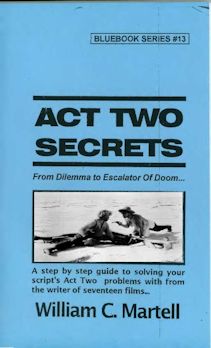
ACT TWO SOLUTIONS!
*** ACT TWO SECRETS *** - For Kindle!
Expanded version with more techniques to help you through the desert of Act Two! Subjects Include: What Is Act Two? Inside Moves, The 2 Ps: Purpose & Pacing, The 4Ds: Dilemma, Denial, Drama and Decision, Momentum, the Two Act Twos, Subplot Prisms, Deadlines, Drive, Levels Of Conflict, Escalation, When Act Two Begins and When Act Two Ends, Scene Order, Bite Sized Pieces, Common Act Two Issues, Plot Devices For Act Two, and dozens of others. Over 67,000 words (that’s well over 200 pages) of tools and techniques to get you through the desert of Act Two alive!
Print version was 48 pages, Kindle version is well over 200 pages!
ONLY $4.99 - and no postage!
BRAND NEW!!
All About Rewrites!
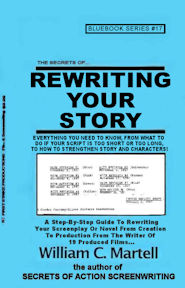
Rewriting In Waves?
*** REWRITES Blue Book! - For Kindle!
The end is just the beginning! You’ve finished your story, but now the rewriting begins! This 405 page book shows you how to rewrite your screenplay or novel to perfection. Everything from Character Consistency to Shoeboxing to How To Give And Receive Notes to 15 Solutions If Your Script’s Too Long! and 15 Solutions If Your Script’s Too Short! to Finding The Cause Of A Story Problem to Good Notes Vs. Bad Notes to Finding Beta Readers to Avoiding Predictability to Learning To Be Objective About Your Work to Script Killer Notes and Notes From Idiots to Production Rewrites and What The Page Colors Mean? and a Complete Rewrite Checklist! The complete book on Rewriting Your Story!
ONLY $4.99 - and no postage!
All About Endings!
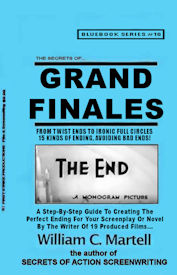
GRAND FINALES Blue Book!
The Perfect Ending For Your Story!
The First Ten Pages Of Your Screenplay Are Critical,
But What About The Last 10 Pages?
Creating the perfect ending to your story! This 100,000 word book shows you how to end your story with a bang, rather than a whimper. Everything from Resolution Order to Act Three Tools to Happy or Sad Endings? to How The Beginning Of Your Story Has Clues To The Ending (in case you were having trouble figuring out how the story should end) to Falling Action to How To Avoid Bad Endings to Writing The Perfect Twist Ending to Setting Up Sequels & Series to Emotional Resolutions to How To Write Post Credit Sequences to Avoiding Deus Ex Machinas, to 20 Different Types Of Ends (and how to write them) and much more! Everything about endings for your screenplay or novel!
Only: $4.99
NO KINDLE REQUIRED! Get the *free* app (any device, except your Mr. Coffee) on the order page on Amazon!
All About LOGLINES, TREATMENTS, and PITCHING!
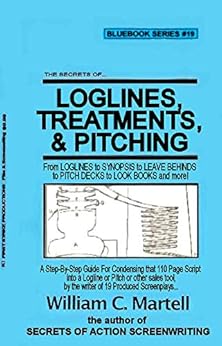
LOGLINES, TREATMENTS, and PITCHING! Blue Book!
Distilling Your Screenplay!
Loglines, Treatments, Pitching, Look Books, Pitch Decks, One Pagers, Rip-O-Matics?
You have written a brilliant 110 page screenplay, but how do you get anyone to read it? You need to distill it down into some form of verbal moonshine or story rocket fuel that will ignite that bored development executive or manager or agent and get them to request your screenplay. But how do you shrink those 110 pages into a 25 word logline or a 2 minute elevator pitch or a one page synopsis or a short paragraph? This 100,000 word book shows you how! Everything you need to know! From common logline mistakes (and how to solve them) to how your pitch can reveal story problems to the 4 types of pitches!
272 Pages - ONLY $4.99!
READY TO BREAK IN?
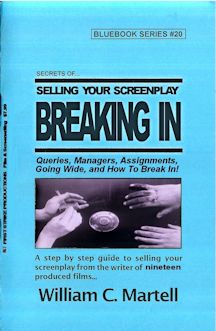
THE BUISINESS SIDE
*** BREAKING IN BLUE BOOK *** - For Kindle!
Should really be called the BUSINESS BLUE BOOK because it covers almost everything you will need to
know for your screenwriting career: from thinking like a producer and learning to speak their language,
to query letters and finding a manager or agent, to making connections (at home and in Hollywood) and
networking, to the different kinds of meetings you are will have at Studios, to the difference between
a producer and a studio, to landing an assignment at that meeting and what is required of you when you
are working under contract, to contracts and options and lawyers and... when to run from a deal!
Information you can use *now* to move your career forward! It's all here in the Biggest Blue Book yet!
Print version was 48 pages, Kindle version is over 400 pages!
$4.99 - and no postage!

Movie Magic Screenwriter is the best selling screenplay formatting software and the choice of Hollywood professionals. Screenwriter automatically formats while you write so you can focus on what you're writing, not where it goes on the page. It also formats for television, stage, novels and comic book scripts so you've got an all in one package for any story you want to write. Academy Award Tech Winner!
* * * Buy It!

|
|
|
|
|
E BOOKS PAGE
|
|
 E BOOKS: New Blue Books and Novelettes!
E BOOKS: New Blue Books and Novelettes!
I am expanding all of the Blue Books from around 44 pages of
text to around 200 pages! Some are over 250 pages! See what is availabale and what is coming soon!Also, I've been writing Novelletes and there
will soon be novels.
E BOOKS: BLUE BOOKS & NOVELLETES
|
|
ONLINE CLASSES
|
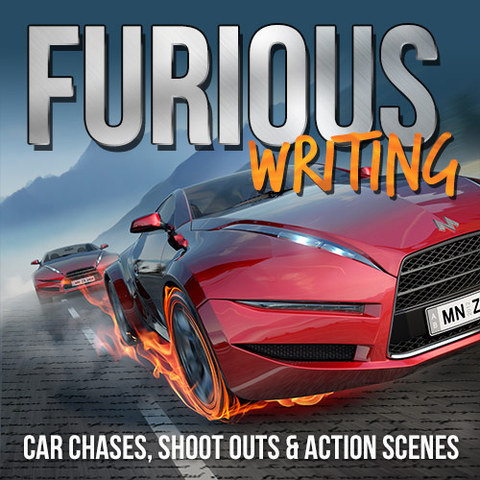
|
|
MY OTHER SITES
|
|
B MOVIE WORLD
Cult Films, Exploitation, Bikers & Women In Prison, Monster Movies.
FIRST STRIKE PRODUCTIONS
Producing my own scripts, investment possibilities, pipe dreams.
|
|
NAKED SCREENWRITING CDs
|
|
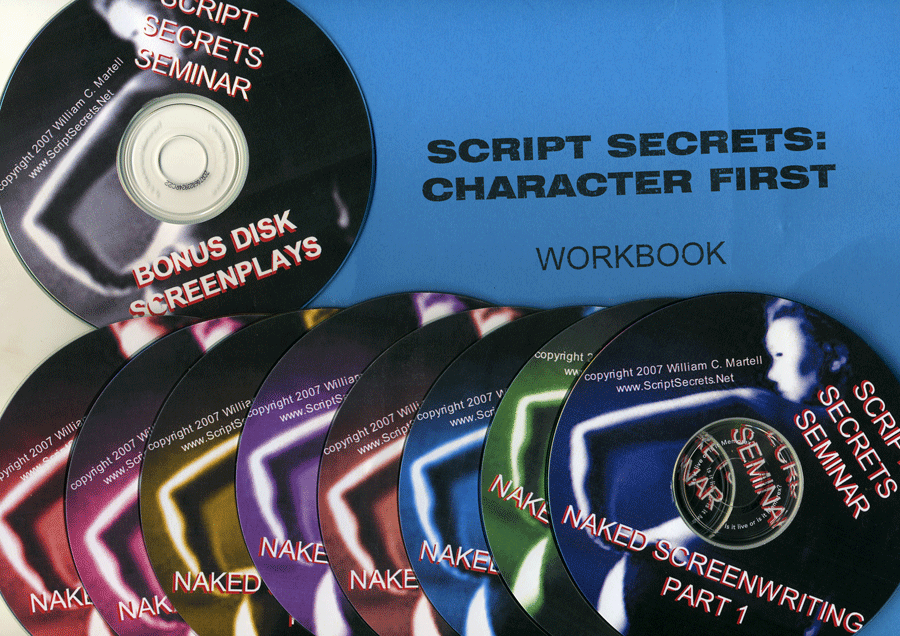 The NAKED SCREENWRITING CLASS ON CD!
The 2001 London Class on 8 CDs! Recorded *live* the morning after the Raindance Film Festival
wrapped. The two day class on 8CDs, plus a workbook, plus a bonus CD with PDFs.
The NAKED SCREENWRITING CLASS ON CD!
The 2001 London Class on 8 CDs! Recorded *live* the morning after the Raindance Film Festival
wrapped. The two day class on 8CDs, plus a workbook, plus a bonus CD with PDFs.
The 2 Day Class on CD!
|
|
BOOKSTORE
|
|
Every screenwriting book in the world!
SCREENWRITER'S BOOKSTORE
In Association With Amazon.com
From the latest screenwriting book to
guides for finding agents and producers... all with at the
Amazon.com discount!
|
|
BOOKLETS & PRODUCTS
|
|
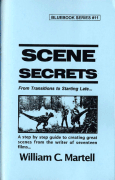 FIRST STRIKE BLUE BOOKS
FIRST STRIKE BLUE BOOKS
Each Blue Book is 48
pages and focuses on a different aspect of screenwriting. Dialogue. Visual Storytelling. Your First Ten Pages. Act 2 Booster. Protagonists. Great Endings.
Seventeen Blue Books now available!
THE SECRETS OF ACTION SCREENWRITING The Best Nuts & Bolts Screenwriting Book On The
Market!
|
|
BILL'S CORNER
|
|
My
nineteen produced films, interviews with me in magazines,
several sample scripts, my available scripts list... And MORE!
...............................BILL'S CORNER
Available Scripts
|
|
CLASSES ON CD
|
|
 CLASSES ON CD! Take a class on CD! GUERRILLA MARKETING - NO AGENT? NO PROBLEM! and WRITING THRILLERS (2 CDs). Full length classes on CD. Now Available: IDEAS & CREATIVITY, WRITING HORROR, WRITING INDIE FILMS, more!
CLASSES ON CD! Take a class on CD! GUERRILLA MARKETING - NO AGENT? NO PROBLEM! and WRITING THRILLERS (2 CDs). Full length classes on CD. Now Available: IDEAS & CREATIVITY, WRITING HORROR, WRITING INDIE FILMS, more!
Take classes on CD!
|
|
|
|
|

